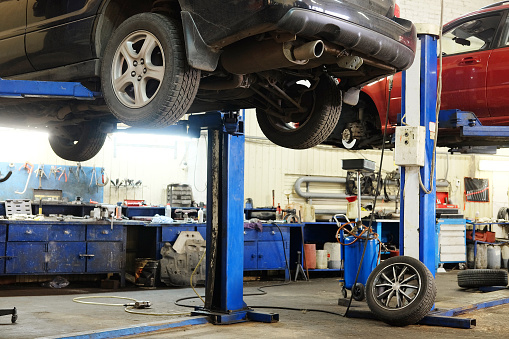All Categories
Featured
Your vehicle's brakes are just one of one of the most critical elements in guaranteeing your safety and the security of others when driving. Regular brake examinations are important to maintaining ideal braking performance and preventing costly repair services. Whether you're an experienced car owner or a brand-new vehicle driver, recognizing brake examination guidelines can assist you remain proactive about upkeep and guarantee your vehicle is constantly roadworthy.
- Why Brake Inspections Matter. The more you drive, the a lot more friction your brake pads endure, ultimately leading to minimized braking performance. Without correct examination, it's tough to evaluate when your brakes may be in need of repair.
A properly maintained brake system ensures fast, responsive quiting power, especially in emergencies. It additionally helps expand the life of your automobile, as ignoring brake upkeep can cause more serious, pricey problems later on.
- Indications You Required a Brake Evaluation. While it's important to have your brakes checked regularly, certain signs may indicate that they require attention. Watch (and ear) out for these warning signals:
Squealing or Grinding Noises: Uncommon audios, especially a high-pitched squeal or grinding sound, frequently indicate that your brake pads are used down. Vibration or Pulsation: If you feel resonances or a pulsing experience when pushing the brake pedal, it could be an indication of distorted blades or irregular brake pad wear. Decreased Brake Responsiveness: If your brakes feel much less responsive or you have to press the pedal harder to decrease, it might show air in the brake lines or low brake liquid. Pulling to One Side: If your lorry pulls away when braking, it can mean uneven brake pad wear or a brake liquid leakage. Dashboard Warning Lights: Some cars and trucks have brake-related caution lights that indicate issues like low brake fluid or used brake parts. If you notice any one of these signs, it's crucial to have a professional mechanic execute a brake inspection asap.

- What Occurs Throughout a Brake Evaluation? Throughout a brake inspection, a technician will certainly inspect numerous crucial parts of the braking system to ensure whatever is in working order. Here's what you can expect during the process:
Brake Pads and Shoes: The mechanic will certainly examine the density of the brake pads or shoes. If they're too thin, they'll require to be replaced. Brake Rotors: Blades are the discs that the brake pads press against to reduce your car down. They'll be looked for any signs of wear, racking up, or warping. Brake Fluid: Low or infected brake fluid can harm stopping performance. The service technician will certainly examine the liquid degree and high quality and top it up or flush it if necessary. Brake Lines and Pipes: Brake lines lug fluid from the master cyndrical tube to the brakes. The auto mechanic will examine for any leakages, splits, or damages to make sure appropriate liquid circulation. Brake Calipers and Wheel Cylinders: Calipers and wheel cyndrical tubes press the brake pads versus the blades or drums. The specialist will look for wear, leakages, and appropriate procedure. 4. Just how Commonly Should You Have Your Brakes Checked? The regularity of brake assessments relies on aspects like your driving habits, the sort of car you drive, and the setting in which you drive. As a basic regulation, it's a good idea to have your brakes inspected every 12,000 miles or yearly. If you experience any of the caution indicators mentioned earlier, it's important to get your brakes checked quickly.
For those who regularly drive in heavy website traffic, hilly surface, or rough climate condition, even more frequent inspections may be required.
- Value of Timely Brake Services. When you identify a problem with your brakes, it's necessary to address it as soon as possible. Postponing brake fixings can result in more significant damages to your braking system, leading to higher repair service costs. In severe instances, ignoring brake problems can lead to complete brake failure, which is a severe security danger.
By remaining on top of brake upkeep and addressing concerns promptly, you make certain that your brakes remain to execute as intended, keeping you and your guests safe when traveling.
Final Thought: Keep Your Brakes in Top Shape. Brake examinations are an easy yet important part of lorry upkeep. By understanding the value of normal assessments, knowing the indications of brake concerns, and staying aggressive with fixings, you can guarantee your car's stopping system remains in optimum condition. Normal brake checks supply peace of mind, recognizing that your auto prepares to respond when you need it most. Focus on brake upkeep-- your safety and security depends on it.
Latest Posts
Explore Limited-Time Auto Repair Deals in Chicago at Montclare Auto Repair
Explore Special Auto Repair Offers in Chicago at Montclare Auto Repair
Unlock Your Financial Partner at WyHy – High Rewards for Wyoming Residents
More
Latest Posts
Explore Limited-Time Auto Repair Deals in Chicago at Montclare Auto Repair
Explore Special Auto Repair Offers in Chicago at Montclare Auto Repair
Unlock Your Financial Partner at WyHy – High Rewards for Wyoming Residents
